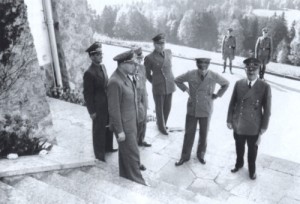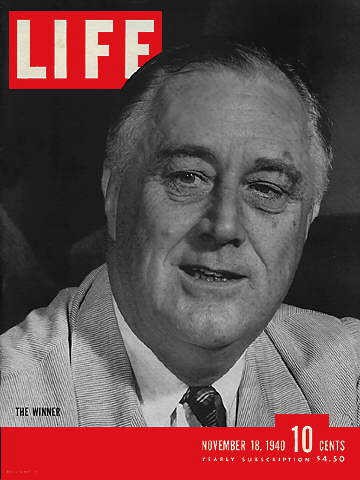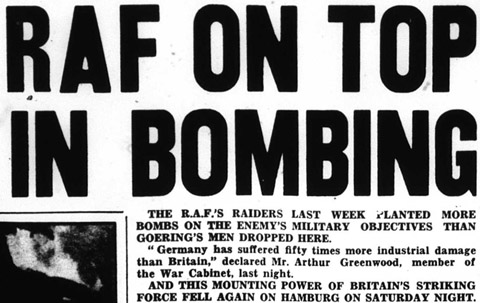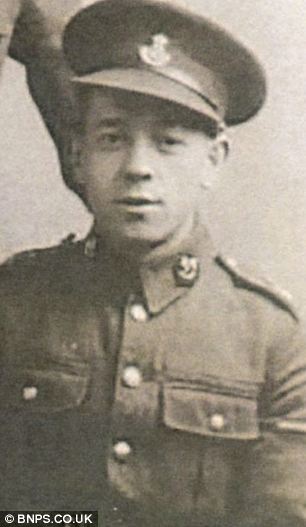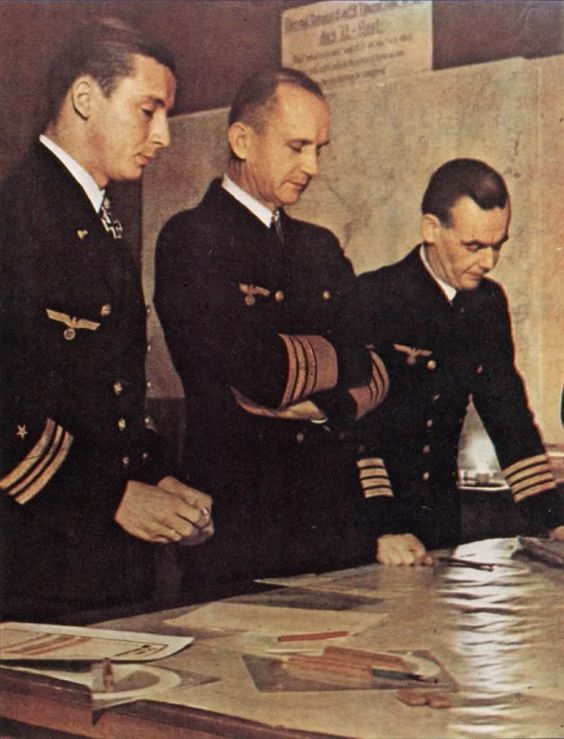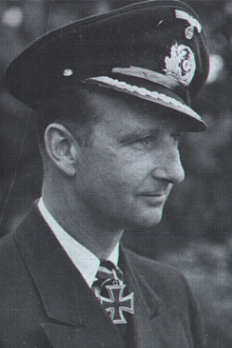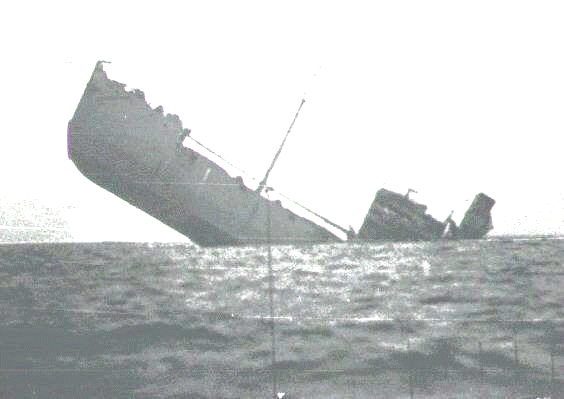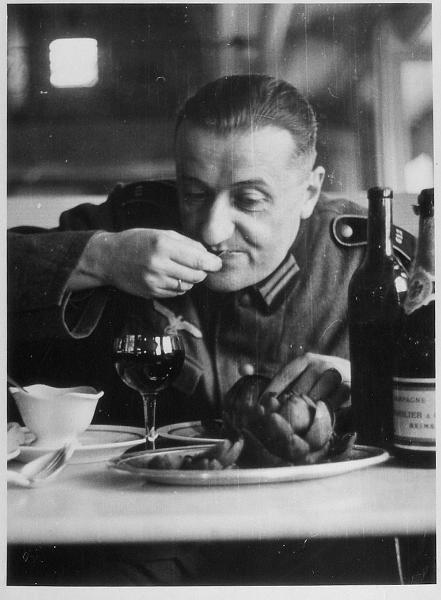Friday 27 September 1940
 |
| The Tripartite Pact signing ceremony, 27 September 1940. Left to right on the dais are Italian Foreign Minister Count Ciano, Japanese Foreign Minister Kurusu, and Adolf Hitler. |
Western Front: The 1st Battalion London Irish Rifles on
27 September 1940 is busy guarding Kent within their normal duty stations at the Sportsman Inn (pub) in Seasalter when they are informed that a German bomber has crash-landed down the road. It is a Junkers Ju 88 piloted by Uffz. Fritz Ruhlandt, shot down by RAF Nos. 66 and 92 Squadrons. The plane winds up at Graveney Marsh near the seawall and is in good condition.
Luftwaffe plane crews almost never try to escape capture - unlike scenes in some popular movies of the time - but this time is different. Rather than meekly surrender, the bomber crew opens fire with two machine guns and whatever other weapons they have on hand. What the crew thought could be accomplished under the circumstances is unclear - there were no other Wehrmacht ground troops within 20 miles - but they resist nonetheless.
Flabbergasted, the British soldiers deploy along the seawall and advance. The Germans wave a white flag, which the approaching soldiers take to mean surrender, but then the Germans open fire again. An exchange of gunfire takes place which injures one of the plane's crew - shot in the foot - and the Germans finally decide to surrender.
The 1st Battalion men then celebrate the victory with their captives back at the pub, while the authorities come to take the plane - which turns out to be a recent model with a new bombsight which is of great interest - to Farnborough Airfield. Captain John Cantopher of the 1st Battalion later receives the George Medal for disarming a demolition charge in the plane.
This is believed to be the last military action to date in the British Isles. A commemorative plaque now hangs in the pub. The moral of the story is that sometimes you can have your cake and eat it, too.
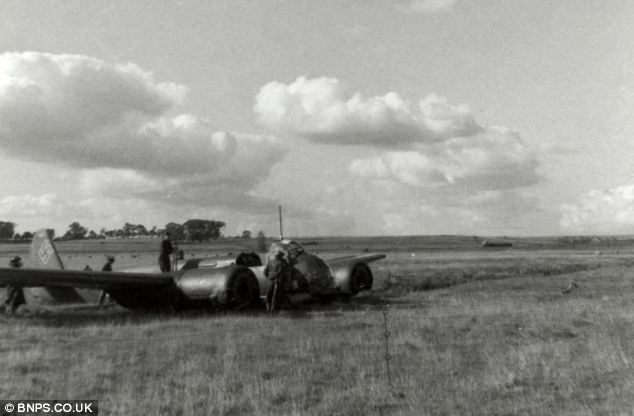 |
| The Junkers Ju 88 shot down over Faversham (near Kent) which wound up in the Graveney Marsh. 27 September 1940. |
Battle of the Atlantic: U-31 (Kptlt. Wilfried Prellberg) sends two torpedoes into and sinks 4319-ton Norwegian freighter Vestvard at 11:30 about 300 miles west of Ireland. One sailor is killed as the ship sinks. There are 30 survivors who take to lifeboats and reach Slane Head Light, Galway, Ireland in about four days. U-31 had been sunk on 11 March 1940 in the Schillig Roads but later refloated. The Vestvard has been sailing in Convoy OB 218, but the convoy scattered on 24 September.
U-37 (Kptlt. Victor Oehrn), operating near U-31 and on her eight patrol, torpedoes and sinks 2555 ton Egyptian iron ore freighter Georges Mabro at 22:59. Everybody aboard perishes, it is unknown exactly how many were aboard. The sinking was quite dramatic, the ship splitting immediately in half and sinking within 30 seconds, and the crew had no time to react.
U-46 (Kptlt. Engelbert Endrass), has been having a successful patrol, having just sunk two ships on the 26th. Operating far out in the Atlantic, suddenly experiences mechanical issues and dives unexpectedly, killing Oberbootsmaat Heinrich Schenk and Matrosenobergefreiter Wilhelm Reh. The U-boat recovers and returns to St. Nazaire, having been at sea for only a week (most patrols last about a month).
Norwegian 1155 ton collier Diana hits a mine and sinks near Lizard Point in the English Channel. All 17 crew on board perish. It is not absolutely certain what happened to Diana, since there were no survivors and there is nothing about her in the surviving German records. Diana had been sailing in Convoy OA 218 previously, but not at the time of her loss. Despite being lost near the coast, all that was ever found were a lifeboat and lifejacket with her name on it, along with scattered debris that may or may not have come from the Diana. The Germans have been using acoustic mines that detonate from the vibrations of propellers of passing ships and that is the likeliest cause of the sinking.
Royal Navy minesweeper 815 ton HMS Halcyon hits a mine off the River Tees, England. The badly damaged ship has several casualties but makes it back to port for extensive repairs.
Royal Navy destroyer HMS Sikh collides with tug Flamer and requires repairs.
Convoy FN 292 departs from Southend, Convoy FS 293 departs from Methil, Convoy OB 220 departs from Liverpool, Convoy SC 6 departs from Sydney, Canada, Convoy SL 49 departs from Freetown.
The majority of the force assembled off Dakar for failed Operation Menace, led by cruiser HMS Cumberland and Cornwall, makes port at Freetown.
Kriegsmarine cruiser Admiral Hipper, attempting a breakout into the Atlantic, has engine trouble, drifts aimlessly at sea for several hours at great risk to itself, then returns to port.
Submarine HMS Unique (N 95, Lt. Anthony F. Collett) and light cruiser HMS Kenya (Captain Michael M. Denny) are commissioned.
 |
| RAF P/O Dennis Secretan transfers today from RAF No. 54 Squadron to No. 72 Squadron at Biggin Hill, which is back in operation. No. 54 Squadron, at RAF Catterick, has been withdrawn due to battle losses. While it is a bad day for the Luftwaffe, Fighter Command also takes heavy losses. |
Battle of the Mediterranean: Two large formations of SM 79 bombers, about 9 bombers in all, escorted by at least a dozen CR 42 fighters, bomb Hal Far and Luqa airfields and surrounding vicinities starting around 17:00. Luqa takes the most damage, but operations are not curtailed. The bombs destroy a Hurricane on the ground and damage a Glen Martin. The defending Hurricane fighters scramble and reportedly down a fighter, with anti-aircraft fire damaging two bombers. One Hurricane sustains minor damage in battle.
The London Times writes a feature about Malta which calls it a "fortress." However, local soldiers realize their high degree of vulnerability.
RAF bombers attack Jarabub, Libya. It contains an important water supply station and is considered one of the most sensitive spots in Libya. Marshal Graziani is very fearful of the interdiction of his supplies at Sidi Barrani.
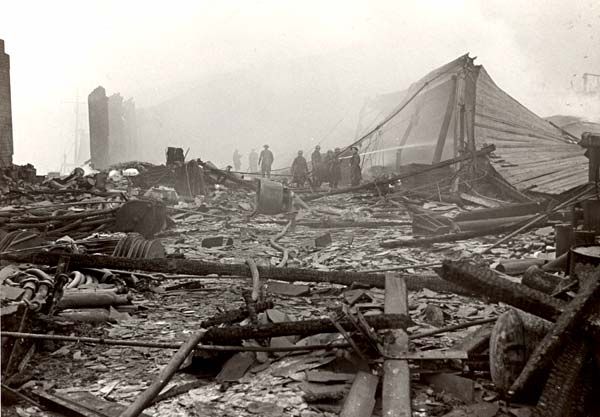 |
| Bomb damage in the West Brunswick section of Liverpool, 27 September 1940. |
Battle of Britain: The Luftwaffe starts early on a fairly clear day, sending about 180 aircraft over Bristol around 09:00. Once again the primary target is aircraft factories, including the Parnall factory at Yale. About 100 of the planes are Bf 109s, with the rest largely Bf 110 fighter-bombers. Most of the Zerstörers scatter when the RAF intercepts and drop their bombs at random to escape, but a few do reach London and their other targets. The day is long remembered in Bristol for the vivid dogfights overhead.
Shortly before noontime, the Luftwaffe sends another raid across, this time totaling 300 aircraft. They head toward Chatham, and Fighter Command gets 20 Squadrons in the air. Due to poor coordination, the Dornier Do 17 and Junkers Ju 88 bombers arrive before the fighter escorts. Most of the bombers drop their bombs to no purpose and scramble for home.
Around this time, the Spitfire factory at Filton receives more attention after the heavy attacks of the previous two days. However, this is primarily a fighter raid which does not cause much damage. These fighters were supposed to rendezvous with the bombers but never do.
After dark, London again is the main target, with other raids on Edinburgh, Liverpool, Birmingham, and Nottingham. The London raids last all night long, clear up to daylight. The raid starts fires at the Thames Ammunition Works which are quickly put out. One bomber drops its bombs on Bristol.
It is a very bad day for the Luftwaffe. Due to the unescorted bomber formations being easy targets for Fighter Command, the Germans lose 55 planes to the RAF's 28.
It is a rough day for the Zerstörer pilots in particular. Gruppenkommandeur Hptm. Horst Liensberger of LG 1 is shot down and killed. Gruppenkommandeur Hptm. Martin Lutz of Epr.Gr 210 is shot down during the morning raid and killed. He and Staffelkapitän of 2 Staffel of Epr.Gr 210 Oblt. Wilhelm Rossiger is awarded the Ritterkreuz posthumously. Oblt. Werner Weymann replaces Lutz.
RAF aces Douglas Bader and James Lacey each claim Bf 109s.
Kommodore Werner Mölders of JG 51, back from his medal ceremony in Berlin and the visit to Reichsmarschall Goering's estate Carinhall, shoots down a Spitfire from RAF No. 222 Squadron for his 41st victory.
Hans-Joachim Marseille claims his 6th victory, a Hurricane over London. He abandons his flight leader and wingman, Staffelkapitän Adolf Buhl, who is shot down and killed over the English Channel. There is some uncertainty whether this happened today or on 23 September. Despite the victory claim, Gruppenkommandeur, Herbert Ihlefeld dresses Marseille down and tears up his outstanding flight evaluation from August in front of him for leaving Buhl. Marseille is gaining a reputation as a prima donna.
A record 172,000 Londoners take shelter in the underground tubes.
The Corpo Aereo Italiano (CAI) sends its bombers from San Damanio di Piacenza and Cameri di Novara airfields in Italy to their new bases on the English Channel front in Belgium. Due to inclement weather encountered while crossing the Alps, nine of them must land at German and Austrian airports.
 |
| On 27 September 1940, Sgt Frank "Itma" Usmar of RAF No. 41 Squadron bails out of his burning Spitfire and lands in an apple orchard near West Malling. His parents live nearby and watch his descent, not knowing who it is. Usmar winds up in the hospital with burns and an injured leg. |
European Air Operations: RAF Bomber Command bombs the port of Lorient, home to a new U-boat base, as well as other ports along the Atlantic coast. Raids also are sent against munitions plants in Dusseldorf and railway installations in Mannheim and Hamm.
German/Japanese/Italian Relations: The three nations formally sign a treaty of mutual defense and aid in the case of an attack by another on a signing country. This is known as the Tripartite Pact. Signing on behalf of their respective nations are Joachim Ribbentrop of Germany, Saburō Kurusu of Japan and Galeazzo Ciano of Italy. This event does not create the Axis, which already exists between Germany and Italy, but does greatly expand its scope. Other names for this treaty are the Berlin Pact and the Rome-Berlin-Tokyo Axis.
One of the most misunderstood pacts in history, the Tripartite Pact is not a formal alliance in the sense that it makes the three countries allies in all endeavors. Japan's "leadership... in the establishment of a new order in Greater East Asia" is recognized, as is the same for Germany and Italy in Europe. It is a forward-looking pact, only obligating the parties in case of future events that trigger sections of the pact. Most significantly, the pact is not triggered when a signing part attacks another country.
The pact's ostensible goal, widely disseminated at the time, is to deter United States aggression. However, other prospective members of the "club" such as Romania cannot help but notice that its general language also would be triggered by attacks from other countries - such as the Soviet Union. In practice, the Tripartite Pact creates a military alliance among the member nations.
The Tripartite Pact of 27 September 1940 forms the foundation for the so-called "Axis powers" of World War II. "Axis" is a term coined by Italian prime minister Benito Mussolini in September 1923 in a preface written for Roberto Suster's "Germania Repubblica." Specifically, the passage is "there is no doubt that in this moment the axis of European history passes through Berlin." Mussolini and others later adopted the word to refer to any alliance or proposed alliance with Germany. Other nations signed over the next couple of years to form a power block in opposition to the Allied nations led by Great Britain and, later, the United States and the Soviet Union. The territories controlled by or allied with the Axis powers reached their peak in the summer of 1942. Numerous states joined and left the Axis throughout the war, and the remaining Axis powers all left the alliance with their defeats or defections in 1943-45.
US Secretary of State Cordell Hull issues the following statement:
The reported agreement of alliance does not, in the view of the Government of the United States, substantially alter a situation which has existed for several years. Announcements of the alliance merely makes clear to all a relationship which has long existed in effect and to which this Government has repeatedly called attention. That such an agreement has been in process of conclusion has been well known for some time, and that fact has been fully taken into account by the Government of the United States in the determining of this country's policies.
 |
| Adolf Hitler at the Tripartite Pact signing ceremony, 27 September 1940. |
Latin American Relations: The United States Senate formally ratifies the Havana Convention ("Provisional Administration of European Colonies and Possessions in the Americas") of 30 July 1940. However, the pact only takes effect upon ratification by two-thirds of the signatories, and that has not happened as of this date (and a handful never do). The Convention permits the signing parties to take control over European colonies whose mother states have been extinguished. In practice, the pact prevents Germany from taking over the colonies in the Americas of the countries that it conquers, such as France and Holland.
US Government: Ambassador Joseph Kennedy, always pessimistic to date about England's chances in the war, sends a message to that effect back to Washington.
President Roosevelt at the White House holds a meeting with A. Philip Randolph, Walter White (the head of the NAACP,) and T. Arnold Hill (an administrator for the Urban League), among others. The issue is hiring practices in the defense industry, which the attendees submit has been highly discriminatory against minorities. Roosevelt responds that opening up the armed services to minorities in the recent Selective Services Act was a big step. US Secretary of the Navy Frank Knox resists integrating the US Navy, stating:
We have a factor in the Navy that is not so in the Army, and that is that these men live aboard ship. And in our history we don’t take Negroes into a ship’s company.
The meeting is inconclusive but starts the ball rolling to further integration of defense contracts and the military in general.
French Indochina: Emperor Hirohito orders the cessation of all Japanese offensive actions in French Indochina, as the objectives have been achieved. The Japanese presence in the south, around Saigon, and in the Mekong Delta, remains sparse.
There are more problems for the French than the Japanese, however. The Japanese previously called for local communists to rise up against the French. These nationalistic uprisings accelerate in the mountains west of Lang Son, a city now occupied by the Japanese.
Palestine: Italian planes try to raid Haifa but are intercepted and turned back.
Romania: The Antonescu government seizes all Jewish-owned land.
Vichy French: The German government requires all Jews in occupied France to carry identity cards that reflect their religion. The Germans require that the Vichy police conduct a census of all Jewish residents.
British Homefront: The Blitz has caused tremendous problems for the London rail service, but repairs are made as quickly as possible and lines put back into operation. Today, previously suspended services between Northfield and Hounslow resume at 08:52, and between Turnham Green and Richmond at 14:00. However, a 250kb bomb lands near the Chalk Farm Northern line station directly above a train tunnel, and service is temporarily suspended. When the damage is examined and found to be no present danger, service is resumed. The railway workers are among the unsung heroes of the Battle of Britain.
American Homefront: The Detroit Tigers clinch the American League Pennant, ending the streak of the New York Yankees, which have won the four previous pennants.
MGM and Loew's Inc. release Busby Berkeley musical "Strike Up The Band" starring Mickey Rooney and Judy Garland.
 |
| Captain John Cantopher, the hero of Graveney Marsh. |
THE BATTLE OF GRAVENEY MARSH
Spitfires, tearing through the sky,
turning like pipistrelles
squaring up to vie
with the Luftwaffe’s’ finest.
During those final throes of the Battle of Britain,
on September 27th,1940...
divesting Germany in a mid-air sortie
of technology much needed
for an island that stood alone
A Junkers 88, barely two weeks old
with the latest navigation aids
and bomb-sights aboard,
wounded,
falling like a dead leaf onto British soil…
At Graveney Marsh, near Whitstable, Kent
the 1st battalion London Irish were sent to
apprehend the luckless crew
who fought for their secret before being subdued
to Lancaster and Halifax went this new technology
to avenge London, Portsmouth,
Southampton and Coventry
This last fought battle on English turf
deserves far more than the obscure footnote
by which history has measured its worth
by Kevin Wells
 |
| Another view of the Graveney Marsh Junkers. |
TEXT OF TRIPARTITE PACT
The Governments of Japan, Germany, and Italy consider it the prerequisite of a lasting peace that every nation in the world shall receive the space to which it is entitled. They have, therefore, decided to stand by and cooperate with one another in their efforts in the regions of Europe and Greater East Asia respectively. In doing this it is their prime purpose to establish and maintain a new order of things, calculated to promote the mutual prosperity and welfare of the peoples concerned. It is, furthermore, the desire of the three Governments to extend cooperation to nations in other spheres of the world that are inclined to direct their efforts along lines similar to their own for the purpose of realizing their ultimate object, world peace. Accordingly, the Governments of Japan, Germany and Italy have agreed as follows:
ARTICLE 1. Japan recognizes and respects the leadership of Germany and Italy in the establishment of a new order in Europe.
ARTICLE 2. Germany and Italy recognize and respect the leadership of Japan in the establishment of a new order in Greater East Asia.
ARTICLE 3. Japan, Germany, and Italy agree to cooperate in their efforts on aforesaid lines. They further undertake to assist one another with all political, economic and military means if one of the Contracting Powers is attacked by a Power at present not involved in the European War or in the Japanese-Chinese conflict.
ARTICLE 4. With a view to implementing the present pact, joint technical commissions, to be appointed by the respective Governments of Japan, Germany and Italy, will meet without delay.
ARTICLE 5. Japan, Germany and Italy affirm that the above agreement affects in no way the political status existing at present between each of the three Contracting Powers and Soviet Russia.
ARTICLE 6. The present pact shall become valid immediately upon signature and shall remain in force ten years from the date on which it becomes effective. In due time, before the expiration of said term, the High Contracting Parties shall, at the request of any one of them, enter into negotiations for its renewal.
 |
| The representatives of Italy, Japan, and Germany sign the Tripartite Pact. |
September 1940September 1, 1940: RAF's Horrible WeekendSeptember 2, 1940: German Troopship SunkSeptember 3, 1940: Destroyers for BasesSeptember 4, 1940: Enter AntonescuSeptember 5, 1940: Stukas Over MaltaSeptember 6, 1940: The Luftwaffe PeaksSeptember 7, 1940: The Blitz BeginsSeptember 8, 1940: Codeword CromwellSeptember 9, 1940: Italians Attack EgyptSeptember 10, 1940: Hitler Postpones SealionSeptember 11, 1940: British Confusion at GibraltarSeptember 12, 1940: Warsaw Ghetto ApprovedSeptember 13, 1940: Zeros Attack!September 14, 1940: The Draft Is BackSeptember 15, 1940: Battle of Britain DaySeptember 16, 1940: Italians Take Sidi BarraniSeptember 17, 1940: Sealion KaputtSeptember 18, 1940: City of Benares IncidentSeptember 19, 1940: Disperse the BargesSeptember 20, 1940: A Wolfpack GathersSeptember 21, 1940: Wolfpack Strikes Convoy HX-72September 22, 1940: Vietnam War BeginsSeptember 23, 1940: Operation Menace BeginsSeptember 24, 1940: Dakar Fights BackSeptember 25, 1940: Filton RaidSeptember 26, 1940: Axis TimeSeptember 27, 1940: Graveney Marsh BattleSeptember 28, 1940: Radio Belgique BeginsSeptember 29, 1940: Brocklesby CollisionSeptember 30, 1940: Operation Lena2020

